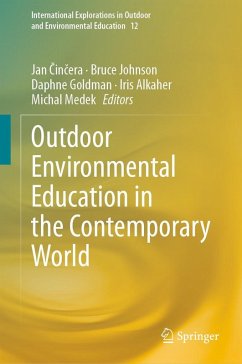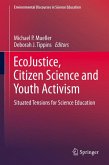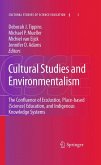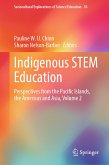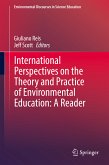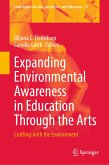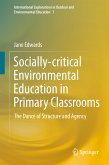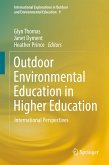Outdoor Environmental Education in the Contemporary World (eBook, PDF)
Redaktion: Cincera, Jan; Medek, Michal; Alkaher, Iris; Goldman, Daphne; Johnson, Bruce


Alle Infos zum eBook verschenken

Outdoor Environmental Education in the Contemporary World (eBook, PDF)
Redaktion: Cincera, Jan; Medek, Michal; Alkaher, Iris; Goldman, Daphne; Johnson, Bruce
- Format: PDF
- Merkliste
- Auf die Merkliste
- Bewerten Bewerten
- Teilen
- Produkt teilen
- Produkterinnerung
- Produkterinnerung

Hier können Sie sich einloggen

Bitte loggen Sie sich zunächst in Ihr Kundenkonto ein oder registrieren Sie sich bei bücher.de, um das eBook-Abo tolino select nutzen zu können.
This edited volume explores the role of outdoor environmental education in the contemporary society. It identifies some of the opportunities and challenges of this educational area, particularly in the growing digitalization of the contemporary society and the distancing between people and nature. Furthermore, it seeks to answer why outdoor environmental education is essential for developing students' environmental citizenship competencies or developing their relationship with nature. The book also introduces the various approaches existing in the field, discusses their relevance, and…mehr
- Geräte: PC
- ohne Kopierschutz
- eBook Hilfe
- Größe: 13.16MB
![EcoJustice, Citizen Science and Youth Activism (eBook, PDF) EcoJustice, Citizen Science and Youth Activism (eBook, PDF)]() EcoJustice, Citizen Science and Youth Activism (eBook, PDF)73,95 €
EcoJustice, Citizen Science and Youth Activism (eBook, PDF)73,95 €![Cultural Studies and Environmentalism (eBook, PDF) Cultural Studies and Environmentalism (eBook, PDF)]() Cultural Studies and Environmentalism (eBook, PDF)161,95 €
Cultural Studies and Environmentalism (eBook, PDF)161,95 €![Indigenous STEM Education (eBook, PDF) Indigenous STEM Education (eBook, PDF)]() Indigenous STEM Education (eBook, PDF)113,95 €
Indigenous STEM Education (eBook, PDF)113,95 €![International Perspectives on the Theory and Practice of Environmental Education: A Reader (eBook, PDF) International Perspectives on the Theory and Practice of Environmental Education: A Reader (eBook, PDF)]() International Perspectives on the Theory and Practice of Environmental Education: A Reader (eBook, PDF)105,95 €
International Perspectives on the Theory and Practice of Environmental Education: A Reader (eBook, PDF)105,95 €![Expanding Environmental Awareness in Education Through the Arts (eBook, PDF) Expanding Environmental Awareness in Education Through the Arts (eBook, PDF)]() Expanding Environmental Awareness in Education Through the Arts (eBook, PDF)105,95 €
Expanding Environmental Awareness in Education Through the Arts (eBook, PDF)105,95 €![Socially-critical Environmental Education in Primary Classrooms (eBook, PDF) Socially-critical Environmental Education in Primary Classrooms (eBook, PDF)]() Jane EdwardsSocially-critical Environmental Education in Primary Classrooms (eBook, PDF)40,95 €
Jane EdwardsSocially-critical Environmental Education in Primary Classrooms (eBook, PDF)40,95 €![Outdoor Environmental Education in Higher Education (eBook, PDF) Outdoor Environmental Education in Higher Education (eBook, PDF)]() Outdoor Environmental Education in Higher Education (eBook, PDF)105,95 €
Outdoor Environmental Education in Higher Education (eBook, PDF)105,95 €-
-
-
The book finishes with an overview of the practice of outdoor environmental education in selected countries from North America, Europe, and Asia.
Dieser Download kann aus rechtlichen Gründen nur mit Rechnungsadresse in A, B, BG, CY, CZ, D, DK, EW, E, FIN, F, GR, HR, H, IRL, I, LT, L, LR, M, NL, PL, P, R, S, SLO, SK ausgeliefert werden.
- Produktdetails
- Verlag: Springer International Publishing
- Seitenzahl: 313
- Erscheinungstermin: 3. Mai 2023
- Englisch
- ISBN-13: 9783031292576
- Artikelnr.: 67882010
- Verlag: Springer International Publishing
- Seitenzahl: 313
- Erscheinungstermin: 3. Mai 2023
- Englisch
- ISBN-13: 9783031292576
- Artikelnr.: 67882010
- Herstellerkennzeichnung Die Herstellerinformationen sind derzeit nicht verfügbar.
